News Archive: 2014
Nov 21, 2014
GU Econ PhD student Nisha Rai writes about maternal health in World Bank publication
GU Econ PhD student Nisha Rai recently posted an article in the World Bank’s Development Impact. The article discusses Rai’s PhD thesis research on the effect of birth attendants on maternal health in Kenya. The article can be found here.
Nov 21, 2014
Gui2de receives a $3 million USAID grant to expand road safety intervention project in East Africa
 The United States Agency for International Development (USAID) awarded a $3 million grant to Billy Jack and James Habyarimana, co-founders and co-directors of Georgetown University Initiative on Innovation, Development and Evaluation, or gui2de. The grant from USAID’s Development Innovation Ventures (DIV) supports the third phase of the Initiative’s Zusha! study in Kenya, and expands the project to three other countries – Tanzania, Uganda and Rwanda.
The United States Agency for International Development (USAID) awarded a $3 million grant to Billy Jack and James Habyarimana, co-founders and co-directors of Georgetown University Initiative on Innovation, Development and Evaluation, or gui2de. The grant from USAID’s Development Innovation Ventures (DIV) supports the third phase of the Initiative’s Zusha! study in Kenya, and expands the project to three other countries – Tanzania, Uganda and Rwanda.
Gui2de conducts empirical field-based research to assess the impact and effectiveness of interventions and policies aimed at empowering individuals in developing countries to improve their lives. GCER co-sponsors Gui2de.
Read more about the grant here.
Oct 20, 2014 New research by GCER Fellow Mark Huggett is featured in recent TACC article
New research by GCER Fellow Mark Huggett is featured in recent TACC article
New research by GCER Fellow Mark Huggett and St. Louis Federal Reserve Bank economist (and former GU PhD student) Alejandro Badel is featured in a recent publication of the Texas Advanced Computing Center (TACC) at the University of Texas. Badel and Huggett develop a quantitative model to analyze the effects of taxing top earners in the U.S. They find optimal tax rates that are higher than those that prevail currently but significantly lower than those proposed by a number of prominent economists. Badel and Huggett show that these proposals discourage human capital investment by top earners and generate lower tax revenue overall.
The TACC article emphasizes the role played by the Stampede supercomputer at the University of Texas. Badel and Huggett turned to Extreme Science and Engineering Discovery Environment (XSEDE) at the TACC to calibrate their model.
The full article by TACC can be found here and Badel and Huggett’s working paper can be found here.
Oct 14, 2014
Razin Prize is awarded to GU Econ Phd student Jason Albert
 The Graduate Committee is pleased to announce that Jason Albert is the winner of the eighteenth annual Razin Prize. Jason received the award for his main dissertation paper titled “Strategic Dynamics of Antibiotic Use and the Evolution of Antibiotic-Resistant Infections“. Established by the Razin family in 1997 to honor the memory of Ofair Razin (1966 – 1996; PhD, Georgetown University, 1996), the Razin Prize is awarded each year for the best dissertation paper produced by an advanced graduate student in Economics at GU.
The Graduate Committee is pleased to announce that Jason Albert is the winner of the eighteenth annual Razin Prize. Jason received the award for his main dissertation paper titled “Strategic Dynamics of Antibiotic Use and the Evolution of Antibiotic-Resistant Infections“. Established by the Razin family in 1997 to honor the memory of Ofair Razin (1966 – 1996; PhD, Georgetown University, 1996), the Razin Prize is awarded each year for the best dissertation paper produced by an advanced graduate student in Economics at GU.
Congratulations to Jason and his advisers Luca Anderlini, John Rust, and Roger Lagunoff.
The Razin Economic Policy Lecture and the award ceremony will take place in the Spring 2015. An announcement will follow closer to that time.
Oct 10, 2014
Fall, 2014. Featured Research Profile
Carbon emissions make the global economy tipsy: Harrison and Lagunoff study a “business-as-usual” scenario in a tipping model.
 For better or worse, the global economy runs on carbon. Climate change resulting from dramatically increased fossil fuel combustion and carbon emissions over the last half century has alarmed scientists and policy experts alike. There is widespread agreement that without an effective international agreement to limit carbon emissions, the continuation of the current trend can have catastrophic consequences.
For better or worse, the global economy runs on carbon. Climate change resulting from dramatically increased fossil fuel combustion and carbon emissions over the last half century has alarmed scientists and policy experts alike. There is widespread agreement that without an effective international agreement to limit carbon emissions, the continuation of the current trend can have catastrophic consequences.
The absence of an international carbon agreement is often described as the “business-as-usual” (or “BAU”) setting. New research by Rodrigo Harrison and GCER Fellow Roger Lagunoff considers such as scenario. They study the countries’ incentives to reduce their carbon emissions under BAU. While most economic studies of climate change examine the incentives of consumers and firms, Harrison and Lagunoff focus specifically on the strategic interaction among the largest players — the countries themselves. Are outcomes under BAU sustainable or is economic collapse inevitable? What determines the transition, if any, from sustainability to collapse?
Departing from standard formulations, Harrison and Lagunoff consider a world in which a country’s GDP depends on both its carbon usage and on how well it maintains the ecosystem. Each country therefore faces a tradeoff for purely nationalistic reasons between, on the one hand, extracting and emitting carbon, and on the other, maintaining a “stock” of stored or “unextracted” carbon required to preserve a healthy ecosystem. Countries naturally differ in how they evaluate this trade off, and even the same country can make different tradeoffs if circumstances change.
In a BAU environment, Harrison and Lagunoff lay out scenarios in which consumption and economic output may collapse and shrink if the carbon stock sustaining the ecosystem falls below some critical threshold — a tipping point.
The results characterize threshold levels of carbon stocks that delineate the safe operating space for humanity — a notion developed by climate scientists (see Rockstrom, et al. (2009)) — from carbon stocks from which tipping occurs. In one unsettling result, Harrison and Lagunoff show that if a strong enough relationship exists between carbon extraction and economic output (as measured by the output elasticities of carbon extraction), a tipping point will certainly be breached. The silver lining is that even in this case, there remains a small window in which tipping may be averted if the countries can depart from BAU and sign on to an effective international treaty to limit emissions.
Reference: Rockstrom, J., W. Steffen, K. Noone, A. Persson, F. Chapin, E. Lambin, T. Lenton, M. Scheffer, C. Folke, H. Schellnhuber, B. Nykvist, C. de Wit, T. Hughes, S. van der Leeuw, H. Rodhe, S. Sorlin, P. Snyder, R. Costanza, U. Svedin, M. Falkenmark, L. Karlberg, R. Corell, V. Fabry, J. Hansen, B. Walker, D. Liverman, K. Richardson, P. Crutzen, and J. Foley ~ (2009), “ A Safe Operating Space for Humanity,” Nature, 461: 472-75, DOI: 10.1038/461472a
Sep 19, 2014
Distinguished Visitor Series resumes for 2014-15
The third year of the GCER Distinguished Visitor Series features a number of prominent economists who will spend time in the Department during the 2014-15 academic year.
 Simon Gilchrist, October 14-17, 2014
Simon Gilchrist, October 14-17, 2014
Professor Gilchrist teaches at the Department of Economics in Boston University and is Research Associate at the NBER. He has published extensively on monetary policy. Professor Gilchrist will visit the Georgetown economics department during the week of October 14-17 where he will present his latest research in the Macroeconomics workshop, and will meet with faculty and students.
 Fernando Alvarez, February 23-27, 2015
Fernando Alvarez, February 23-27, 2015
Fernando Alvarez is a professor of economics at the University of Chicago and Fellow of the Econometric Society. He is well known for his work in endogenously incomplete markets. Professor Alvarez will visit the Department during the week of March 2-6 where he will present his latest research in the Macroeconomics workshop, and will meet with faculty and students.
 Steven Callander, February 23-27, 2015
Steven Callander, February 23-27, 2015
Steven Callander is professor of political economy at Stanford’s Graduate School of Business. He will visit the Department during the week of March 16–March 20 where he present his latest research in the Microeconomics workshop, and will meet with faculty and students.
Aug 9, 2014
Schedule of upcoming speakers for Third GCER-IZA Young Scholar Program announced.
The IZA and the Georgetown Center of Economic Research (GCER) of Georgetown University’s Economics Department are pleased to announce the speaker schedule for the the third IZA@DC Young Scholar Program. The program, a joint effort by GCER and the IZA to bring outstanding PhD students to Washington, DC, is set to take place from September 22 – 26, 2014 at Georgetown University in Washington DC. The speaker schedule is as follows; detailed program of the conference can be found here.
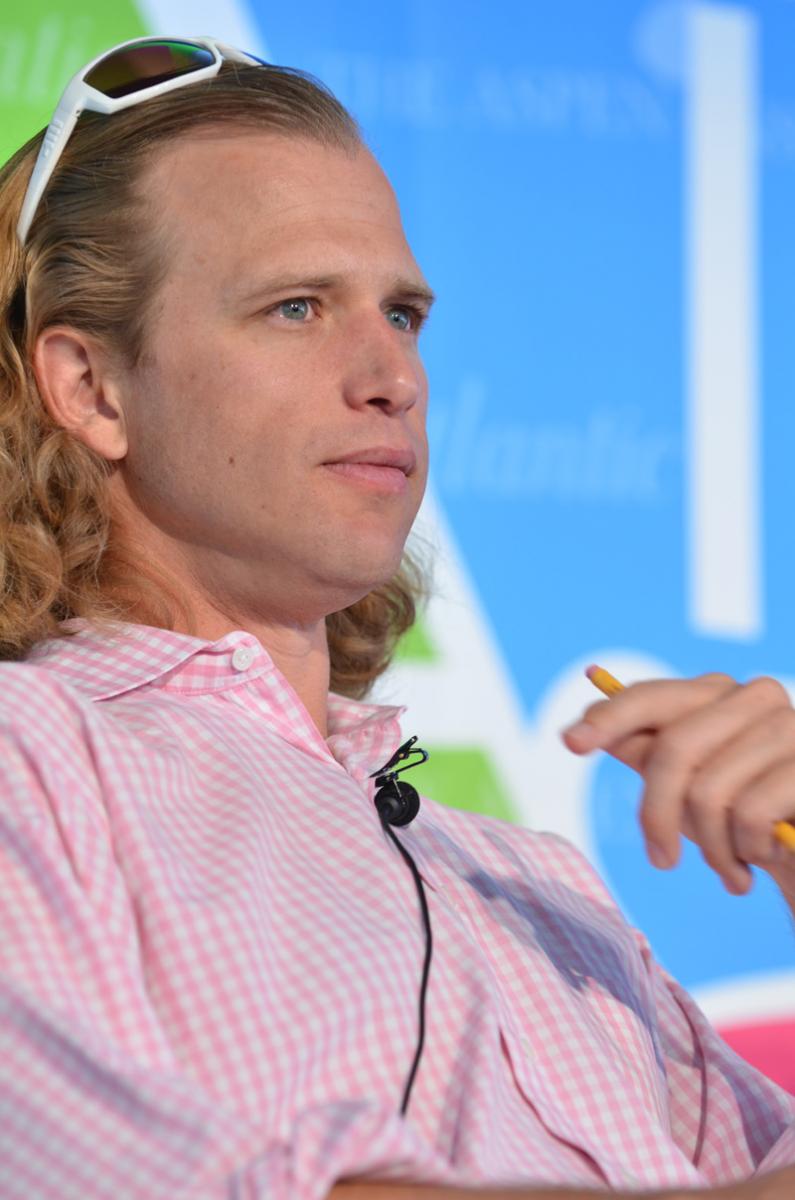 Monday, September 22: Justin Wolfers (University of Michigan)
Monday, September 22: Justin Wolfers (University of Michigan)
Justin Wolfers is a Professor of Public Policy at the Ford School and Professor of Economics. at the University of Michigan. His research interests include labor economics, behavioral economics, and social and legal policy. His latest research focuses on subjective well being. A recent paper by Professor Wolfers (with Betsy Stevenson) analyzes multiple datasets and multiple definitions of “basic needs” documenting the relation between subjective well being and income.
 Tuesday, September, 23: Kevin Lang (Boston University)
Tuesday, September, 23: Kevin Lang (Boston University)
Professor Lang is Professor of Economics at Boston University, Fellow of the Society of Labor Economists, and Research Associate of the NBER. Over the years, his research has tackled labor topics ranging from discrimination and unemployment to market returns to education. In recent work, Professor Lang examines the relation between high school exit exams of students on graduation and incarceration rates, employment, and wages.
 Wednesday, September 24: Giuseppe Moscarini (Yale University)
Wednesday, September 24: Giuseppe Moscarini (Yale University)
Professor Moscarini is Professor of Economics at Yale University, Research Associate at the NBER, and Co-Director of the Macroeconomics Research Program at the Cowles Foundation. His research is wide ranging and includes diverse topics from social learning and and innovation to occupational choice and job mobility. New research by Professor Moscarini analyzes and documents the breakdown of the “job ladder” after the Great Recession.
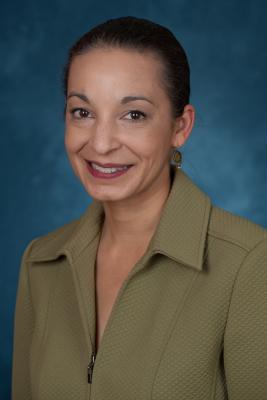 Thursday, September 25: Professor Caroline Hoxby (Stanford University)
Thursday, September 25: Professor Caroline Hoxby (Stanford University)
As the Bommer Professor of Economics at Stanford University, and Director of Economics of Education Program for the NBER, Caroline Hoxby is well known for her empirical studies of labor markets and tax education policy, including prominent work on the effects of school choice on educational quality. Professor Hoxby’s recent research focuses on the effects of education on economic growth, and on the market for college education
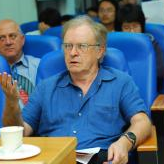 Friday, September 26: John Kennan (University of Wisconsin)
Friday, September 26: John Kennan (University of Wisconsin)
Professor John Kennan is the Richard Meese Professor of Economics at the University of Wisconsin-Madison and a Fellow of both the Econometric Society and the Society of Labor Economists. Long known for his studies of firm level interactions and worker behavior, Professor Kennan’s recent work examines the policy implications of higher education subsidies on labor migration decisions and human capital mobility.
Jul 22, 2014
GCER and GU faculty welcome Mary Ann Bronson as newest departmental fellow
 Georgetown Department of Economics and Center for Economic Research welcome its newest member, Mary Ann Bronson who joins the department and GCER in the Fall of 2014. Bronson arrives from the University of California, Los Angeles, where she received her PhD. Her most recent work explores the dynamics of gender differences in college attendance and choice of major. She constructs a dynamic structural model of marriage, educational choices, and lifetime labor supply to analyze the contribution of changes in wages and the marriage market to the observed educational investment patterns over time.
Georgetown Department of Economics and Center for Economic Research welcome its newest member, Mary Ann Bronson who joins the department and GCER in the Fall of 2014. Bronson arrives from the University of California, Los Angeles, where she received her PhD. Her most recent work explores the dynamics of gender differences in college attendance and choice of major. She constructs a dynamic structural model of marriage, educational choices, and lifetime labor supply to analyze the contribution of changes in wages and the marriage market to the observed educational investment patterns over time.
Jul 2, 2014
GCER Fellow Bouton’s work featured in The Economist.
GCER Fellow Laurent Bouton’s paper “Guns and Votes” has been featured in The Economist and FiveThirtyEight. In his paper, Bouton argues that re-election motives can lead politicians to take a pro-gun stance against the interests of an apathetic majority of the electorate, but in line with the interests of an intense minority.
May 16, 2014
GCER Fellow Ravallion discusses Piketty’s book in Indian Express
GCER Fellow and Professor of Economics Martin Ravallion wrote a column titled “Reading Piketty in India” in the Indian Express on May 15, 2014. In the article, Ravallion argues that inequality in human capital, rather than physical capital, is India’s biggest concern right now.
May 9, 2014
GCER Fellow Laurent Bouton joins NBER as Research Fellow
GCER Fellow Laurent Bouton was recently inducted into the National Bureau of Economic Research as a Faculty Research Fellow. Bouton joins other GCER Fellows Robert Cumby, Martin Evans, Garance Genicot, Arik Levinson, and Martin Ravallion in that select group.
Apr 25, 2014
GU Econ PhD students Jacob Mortenson and Alison Weingarten share prestigious Jordan Award
For the third straight year, The Economic Club of Washington presents its prestigious Vernon E. Jordan Jr Fellowship Award to a GU Economics PhD student. In this case, there are two: This year’s Jordan Fellowship award was shared by Jacob Mortenson and Alison Weingarten. Jacob and Alison follow past GU Econ recipients, Claire Brunel and Mauricio Villamizar as Jordan Fellowship recipients. As this year’s winners, Jacob and Alison will present their research findings to The Economic Club of Washington in the Spring of 2014.
Apr 15, 2014
GCER Fellow interviewed in the New York Times and NPR
GCER Fellow, Laurent Bouton was interviewed by the New York Times and NPR for their feature on the Senate primaries. Bouton is assistant professor of Economics at Georgetown and studies electoral systems and voter behavior. He has also written a column on the ‘gun-control paradox’ in VoxEU.
Apr 10, 2014
Jun Ma, PhD ’94, is the new chief economist of the People’s Bank of China.
Jun Ma will join the People’s Bank of China as chief economist in its research bureau. Previously, he was Deutsche Bank AG’s chief China economist. Ma holds a PhD in Economics from Georgetown University.
Apr 4, 2014
Third GCER-IZA Young Scholar Program set for September 21-26, 2014.
IZA and the Georgetown Center of Economic Research (GCER) of Georgetown University’s Economics Department are very pleased to announce the third IZA@DC Young Scholar Program which will take place from September 21 — 26, 2014 at Georgetown University in Washington DC. The program is a joint effort by GCER and the IZA to bring outstanding PhD students to Washington, DC.
The program encourages interaction between talented PhD students and labor economists located in the Washington, D.C. metropolitan area. On each of the five days of the program a leading labor economist will present his/her frontier research. Students will be given the opportunity to collectively meet with each of the speakers and to discuss their own research. In addition the students will formally present their own research. They will also visit IZA Research Fellows located in Washington, DC at their home institutions. The program is designed for advanced PhD students from outside the US working in the field of labor economics with an interest in joint research projects with local universities or public institutions in the DC area. The number of participants is limited to a maximum of 10 students.
IZA Research Fellows located outside the US can nominate their PhD students by submitting a nomination statement, the student’s CV and research paper by April 20, 2014 using the online nomination form. If a grant for travel expenses is required, please indicate with the nomination and submit a short explanation. Acceptance decisions will be communicated by mid of June.
Apr 2, 2014
The 13th Annual Carroll Round is set to take place on April 10-13, 2014 at Georgetown University
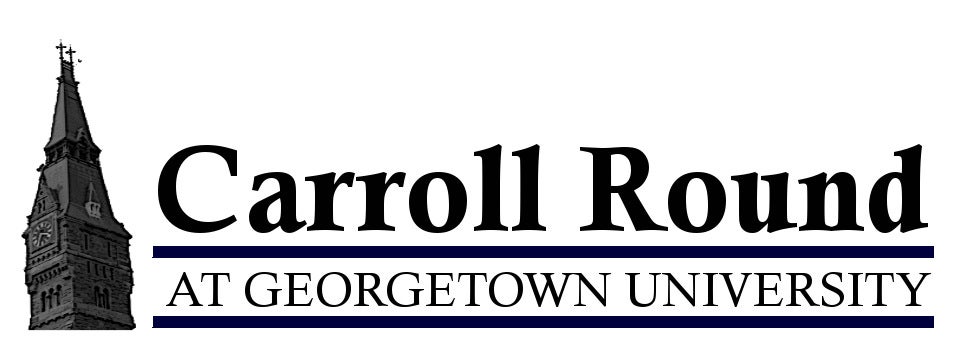
The Carroll Round Steering Committee cordially invites you to save the dates for the 13th Annual Carroll Round at Georgetown University. This year, the international economics conference will be April 10-13, 2014 with presentation sessions and speakers on that Friday and Saturday.
A formal RSVP invitation will follow in the coming weeks with details.
For more information on Carroll Round events, please visit our website at http://carrollround.georgetown.edu/
Apr 1, 2014
Seventeenth Annual Razin Prize.
 The Graduate Committee is pleased to announce that James O’Brien has won the seventeenth annual competition for the Razin Prize, for his paper “Essays in Environmental and Development Economics.” Congratulations to James and his dissertation advisor Arik Levinson.
The Graduate Committee is pleased to announce that James O’Brien has won the seventeenth annual competition for the Razin Prize, for his paper “Essays in Environmental and Development Economics.” Congratulations to James and his dissertation advisor Arik Levinson.
The award ceremony will be held on April 7th 2014, and will coincide with the annual Razin Lecture in Economic Policy by Assaf Razin (Cornell).
Apr 1, 2014
Professor Assaf Razin to deliver Razin Policy Lecture in April
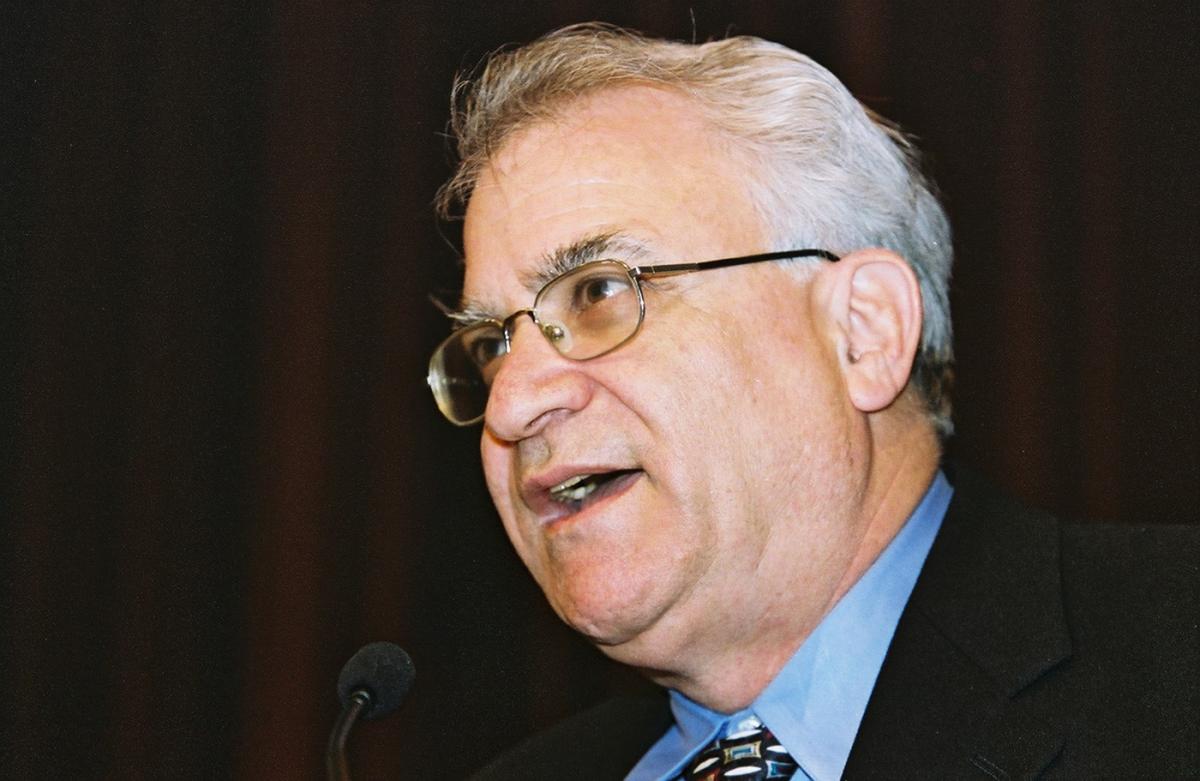 GCER is pleased to announce that Assaf Razin, The Friedman Professor of International Economics at Cornell University will present the 2014 Razin Policy Lecture at Georgetown University. This year’s Razin Lecture will take place on Monday, April 7, 2014 from 4:00 – 6pm at the ICC auditorium.
GCER is pleased to announce that Assaf Razin, The Friedman Professor of International Economics at Cornell University will present the 2014 Razin Policy Lecture at Georgetown University. This year’s Razin Lecture will take place on Monday, April 7, 2014 from 4:00 – 6pm at the ICC auditorium.
Assaf Razin is a renowned economist whose work spans a wide range of issues and problems. Professor Razin is father of the late Ofair Razin in whose honor the Lecture is named. The Razin Lecture is to be accompanied by the awarding of the Razin Prize for best research paper by an advanced graduate student. Click here for more on the Razin Prize and Policy Lecture, its background, and history.
Mar 24, 2014
The inaugural Washington Political Economy Conference held at GU.
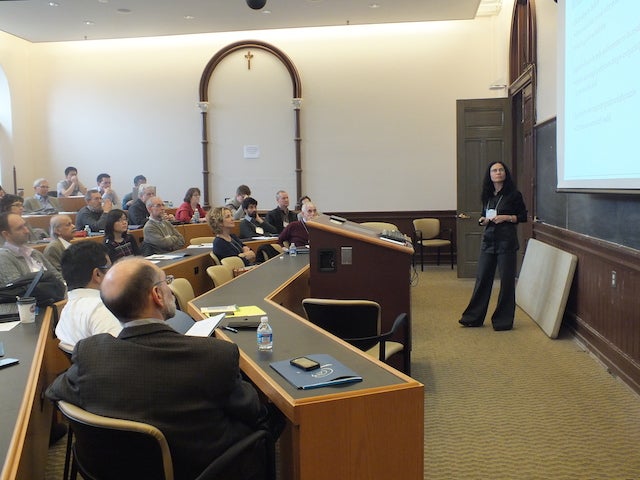 The inaugural Washington PECO, a political economy conference hosted jointly by the Georgetown Center for Economic Research (GCER), the Department of Economics, the School of Foreign Service and the Department of Government at Georgetown University was held in Georgetown University on March 21 and 22. See the conference website for more information.
The inaugural Washington PECO, a political economy conference hosted jointly by the Georgetown Center for Economic Research (GCER), the Department of Economics, the School of Foreign Service and the Department of Government at Georgetown University was held in Georgetown University on March 21 and 22. See the conference website for more information.
Mar 23, 2014
8th Conference of the International Research Forum on Monetary Policy.
The conference, held on March 21 and 22, was sponsored by the Federal Reserve Board (FRB), the European Central Bank (ECB), the Georgetown Center for Economic Research (GCER) at Georgetown University, and the Center for Financial Studies (CFS) at Goethe University.
Mar 8, 2014
Gui2de Sponsored Pro-Poor Conference emphasizes innovation.
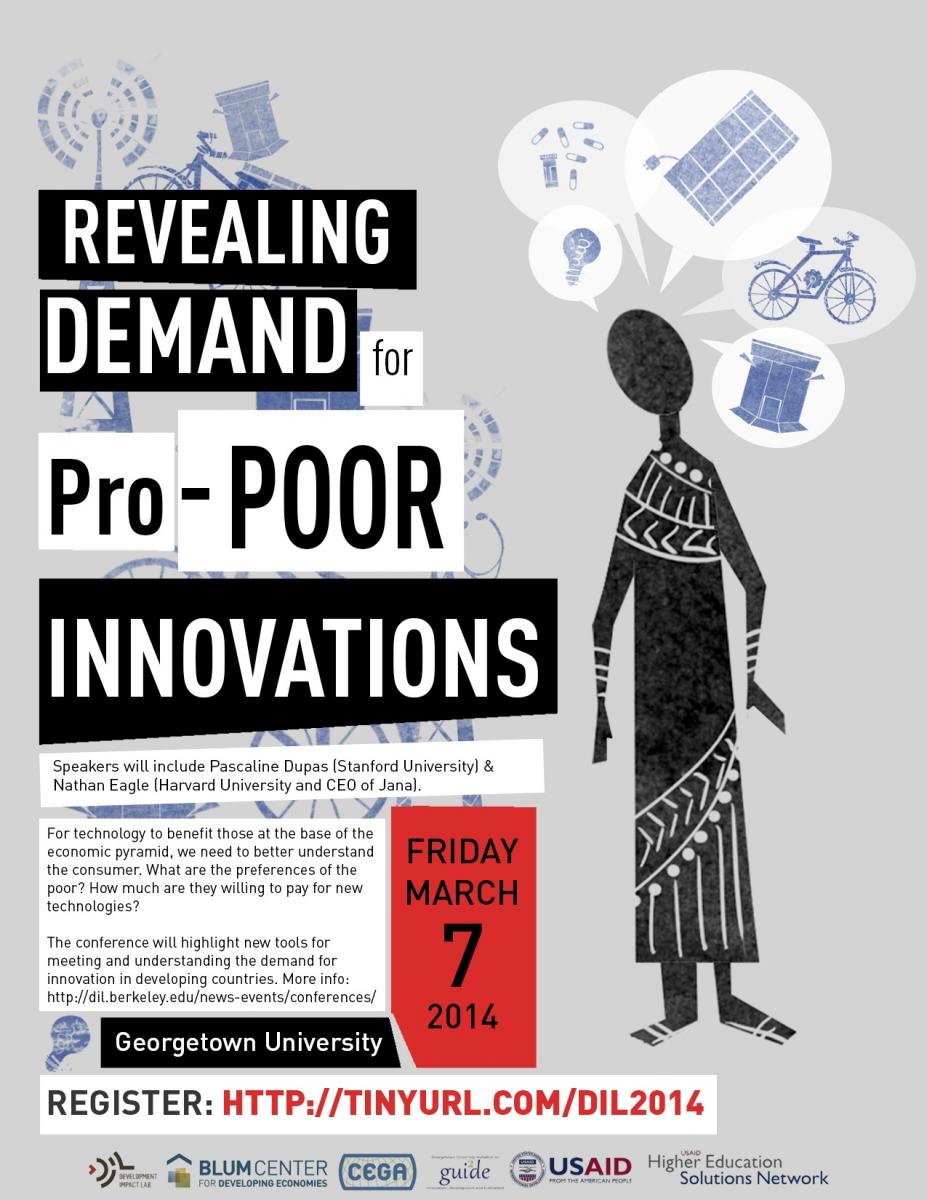 The March 7 conference, co-hosted by Gui2de, was held on the GU campus. See Pro-Poor Conference for more information.
The March 7 conference, co-hosted by Gui2de, was held on the GU campus. See Pro-Poor Conference for more information.
Feb 12, 2014
Spring, 2014. Featured Research Profile
Collateral Damage to Standard Economic Theory… GCER Fellow Dan Cao shows how incorrect beliefs can fuel a crisis.
 In the years leading up to the financial crisis of 2008, several financial institutions invested heavily in highly risky mortgage-backed securities. Financial markets allowed these institutions, including prominent banks, to speculate on the future returns of these securities. When home prices crashed in around 2006-2007, mortgage interest rates soared, leading to defaults by homeowners. This drastically reduced the value of those securities. During this time, some hedge funds profited by short-selling these securities.
In the years leading up to the financial crisis of 2008, several financial institutions invested heavily in highly risky mortgage-backed securities. Financial markets allowed these institutions, including prominent banks, to speculate on the future returns of these securities. When home prices crashed in around 2006-2007, mortgage interest rates soared, leading to defaults by homeowners. This drastically reduced the value of those securities. During this time, some hedge funds profited by short-selling these securities.
In his paper “Collateral Shortages, Asset Price and Investment Volatility with Heterogeneous Beliefs“, GCER Fellow Dan Cao finds that, contrary to standard economic theory, such speculators with possibly incorrect beliefs survive in the long run and their speculative activities permanently drive up price and volatility.
The standard view dating back to Friedman (1953) hypothesizes that agents with incorrect beliefs will eventually be driven out under complete markets and will have no influence in the long run. Under incomplete markets, in contrast, Cao shows that financial institutions speculating with potentially incorrect beliefs survive in the long run drive up asset price and real investment volatility. The financial institutions mentioned above could just walk away from their collateral and get back into the market at a later time, using their current and future endowments, since the penalty for bad bets for these institutions is low. Additionally, Cao introduces a framework to model the effect of agents with heterogeneous (potentially incorrect) beliefs on asset prices. Further, using this framework, he studies the impact of different types of regulations on welfare, asset price volatility and investment.
Jan 23, 2014
GCER Fellow’s research on electronic money is highlighted in MIT News.
 New research on the role of electronic payment systems in Kenya by GCER Fellow William Jack and MIT’s Tavneet Suri made headlines in the MIT News. The article highlights a recent publication by Jack and Suri in the American Economic Review that examines the impact of the new electronic payments system, known as M-PESA. Jack and Suri document the consumption-smoothing benefits to households that use the M-PESA. Click here to see the full article.
New research on the role of electronic payment systems in Kenya by GCER Fellow William Jack and MIT’s Tavneet Suri made headlines in the MIT News. The article highlights a recent publication by Jack and Suri in the American Economic Review that examines the impact of the new electronic payments system, known as M-PESA. Jack and Suri document the consumption-smoothing benefits to households that use the M-PESA. Click here to see the full article.
Jan 15, 2014
GCER Fellow’s Obesity Studies Picked up by the Huffington Post.
 An NBER study on obesity by GCER Fellow Matthew Harding was recently reported in the January 14, 2014 edition of the Huffington Post. Harding, a Visiting Fellow from Stanford University, and co-author Michael Lovenheim of Cornell examine the potential effect of a sugar tax on obesity outcomes in the U.S. Using data on 123 million food purchases made in the U.S. between 2002 and 2007, they find that a 20% tax on sugar would result in an 18% reduction in overall caloric intake Americans. Read here for more information.
An NBER study on obesity by GCER Fellow Matthew Harding was recently reported in the January 14, 2014 edition of the Huffington Post. Harding, a Visiting Fellow from Stanford University, and co-author Michael Lovenheim of Cornell examine the potential effect of a sugar tax on obesity outcomes in the U.S. Using data on 123 million food purchases made in the U.S. between 2002 and 2007, they find that a 20% tax on sugar would result in an 18% reduction in overall caloric intake Americans. Read here for more information.
